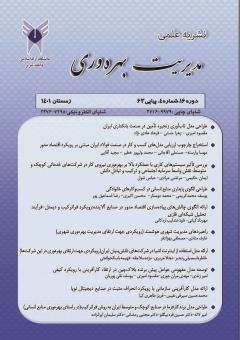ارائه الگوی چالشهای پیادهسازی اقتصاد مدور در صنایع آلاینده:رویکرد فراترکیب و دیمتل-فرآیند تحلیل شبکهای فازی
محورهای موضوعی : مدیریت صنعتی
مهرداد کیانی
1
![]() ,
داود عندلیب اردکانی
2
*
,
داود عندلیب اردکانی
2
*
1 - دانشجوی دکتری گروه مدیریت صنعتی، دانشکده اقتصاد، مدیریت و حسابداری، دانشگاه یزد، ایران
2 - دانشیار گروه مدیریت صنعتی، دانشکده اقتصاد، مدیریت و حسابداری، دانشگاه یزد، ایران
کلید واژه: توسعه پایدار, چالش, فراترکیب, اقتصاد مدور, تکنیک دیمتل-فرآیند تحلیل شبکهای فازی,
چکیده مقاله :
پژوهش حاضر به دنبال ارائه الگویی نوین از روابط بین چالشهای پیادهسازی اقتصاد مدور در صنایع آلاینده است. این پژوهش از نظر هدف جزو تحقیقات کاربردی-توسعهای و نظر نوع تحقیق، ترکیبی (آمیخته اکتشافی) قلمداد میشود. صنعت شیشهسازی یزد به عنوان یکی از صنایع آلاینده کشور انتخاب و از 10 خبره این صنعت که به صورت هدفمند انتخاب شدند، نظرخواهی شد. در بخش کیفی تحقیق، جهت شناسایی چالشها و دستهبندی آنها از رویکرد فراترکیب و در بخش کمی جهت ارائه الگوی روابط بین این چالشها و اولویتبندی آنها از روش ترکیبی دیمتل-فرآیند تحلیل شبکهای فازی استفاده شد. یافتههای بخش کیفی شامل شناسایی 27 چالش در 6 بُعد چالشهای اقتصادی، فرهنگی و اجتماعی، مدیریتی، سازمانی، زیرساختی و فناوری، بازار و طراحی بود. در بخش کمی، یافتهها نشان داد که چالشهای اقتصادی تأثیرگذارترین و چالشهای بازار و طراحی تأثیرپذیرترین چالشها در پیادهسازی اقتصاد مدور محسوب میشوند. همچنین، چالشهای سازمانی تعامل بیشتری با سایر چالشها دارد. در تحلیلی کاملتر، چالشهای عدم اطمینان در مورد بازار (بهعنوانمثال، رکود اقتصادی)، وجود ذهنیت خطی در مدیران و عدم تفکر سیستمی و مدور و چالش تقاضای کم مشتریان برای محصولات بازیافتی مهمترین چالشهای موجود در پیادهسازی اقتصاد مدور در صنایع آلاینده همانند صنعت شیشهسازی محسوب میشود. درنهایت، میزان تأثیرپذیری و تأثیرگذاری هر یک از چالشها با یکدیگر شناسایی گردید که میتواند به عنوان نقشه راهی جهت استفاده مدیران و کارشناسان در جهت کاربست اقتصاد مدور در صنایع آلاینده کشور قرار گیرد.
The present study sought to provide a pattern of the relationships among the challenges of implementing a circular economy in polluting industries. In terms of purpose, this research is considered as a component of applied developmental research and regarding research type, it is considered as a mix method (exploratory mix) one. Yazd glass industry was selected as one of the polluting industries in the country and ten experts in this industry who were purposefully selected, were polled. In the qualitative part of the research, the Meta-synthesis approach was used to identify the challenges and categorize them, and in the quantitative part, the Fuzzy DEMATEL-ANP method was used to present the pattern of relationships among these challenges and prioritize them. The qualitative findings included identifying 27 challenges in six dimensions: economic, cultural and social, managerial, organizational, infrastructure and technology, market and design. In quantitative terms, the findings showed that economic challenges are the most effective and market and design challenges are the most affected challenges in implementing a circular economy. Also, the organizational challenges were found to interact more with other challenges. In a more complete analysis, the challenges of market uncertainty (e.g., recession), the existence of a linear mindset in the managers, the lack of systematic and circular thinking, and the challenge of low customer demand for recycled products are the most important challenges in implementing a circular economy in polluting industries such as the glass industry. In addition, the impact and effectiveness of each of the challenges were identified in their relationship to each other, which can be a roadmap for the use of managers and experts of different organizations to implement a circular economy.

